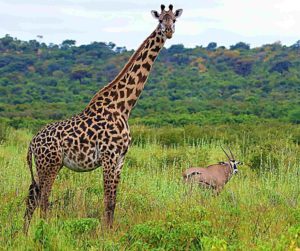
Nairobi, Kenya– A groundbreaking report released today by World Animal Protection unveils the alarming, inhumane treatment of wild animals trapped in commercial wildlife farming in Kenya. The report reveals shocking animal cruelty, serious public health threats, and risks to the country’s global conservation reputation.
The report, titled “Behind Bars: Lifting the Lid off Kenya’s Cruel Wildlife Farming,” is based on months of extensive research and undercover field investigations.
It documents how wild animals—including crocodiles, giraffes, ostriches, tortoises, monkeys, and hippos—are bred, confined, and exploited in captive facilities across Kenya under the guise of conservation and tourism.
It further reveals how Kenya’s wildlife is illegally extracted from the wild and exported as though they are captive-bred, a practice that is contributing to biodiversity loss.
Edith Kabesiime, Wildlife Campaign Manager at World Animal Protection, said, “Our findings confirm that wildlife commercial breeding and farming in Kenya is not about conservation, but about profit at the expense of animal welfare and biodiversity.
The illegal aspects of this exploitation are very worrying, putting into question Kenya’s pro-wildlife trade policy. This report sheds light on the suffering endured by farmed wild animals, exposing laundering of species through the legal systems, and the urgent need for policy change.”
Key Findings from the investigation:
- Animal Suffering: Every facility investigated revealed serious animal welfare concerns, including overcrowding, untreated injuries, parasite infestations, poor nutrition, and severe stress behaviours.
- Public Health Threats: Some tourist venues investigated allowed close animal-human interactions, lacked basic standard operating procedures such as handwashing, posing a risk of zoonotic disease transmission.
- Conservation Undermined: Field visits confirmed that captive wildlife farming fueled illegal extraction of wild animals from the wild and traded as though they were born in captivity.
Call to Action:
World Animal Protection is calling on the Kenyan government to take immediate action, including:
- Immediately prosecute and shut down exploitative wildlife farming facilities and enforce a moratorium on captive wildlife farming expansion.
- Proactively enforce laws to prevent illegal trade and exploitation of wildlife.
- Ban wild animal-visitor interactions (AVIs) such as hand feeding and petting of wild species.
Tennyson Williams, the Director for Africa at World Animal Protection, during the launch said, “Today, as we officially unveil this report, we urge Kenya’s Ministry of Tourism and Wildlife, and Kenya Wildlife Services to take leadership in ending wildlife exploitation and setting a precedent for wildlife-friendly policies and practices in the region. Kenya has the opportunity to address these gaps, especially at this time when the country is in the process of developing a new wildlife law, currently at the Bill stage”.
The report paints a picture illustrating that wildlife farming is not a sustainable solution for Kenya or any other nation. It perpetuates animal suffering, undermines conservation efforts, and poses serious risks to public health. The Kenyan government, private sector, and individuals must come together to end this practice and ensure that wild animals are protected in their natural environments.


